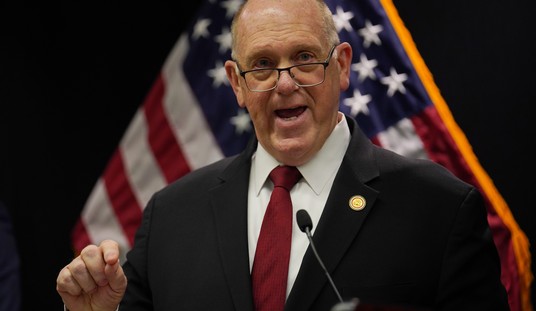We regret to inform you that your Christmas gifts are still offshore. Despite a flurry of activity at the White House after the media began pressing them about the upcoming holiday season, not much has actually changed. The Washington Post’s David Lynch reports that the supply-chain crisis is instead still growing worse after Joe Biden’s executive actions two weeks ago:
Two weeks after Biden administration officials announced steps toward round-the-clock operations at the nation’s chief port complex, the backlog of ships anchored off the coast of Southern California has only grown larger. There is little sign that truckers are taking advantage of terminals’ extended hours to move containers off the crowded docks.
At APM Terminals’ Pier 400 in Long Beach, Calif., the largest such privately owned facility in North America, nearly half of the 2,000 available appointments for truckers went unused Friday, according to Maersk, which owns the site.
As complaints mount from affected shippers, administration officials are pressing ports, terminals and truckers to rethink their operations. On Monday, the ports of Los Angeles and Long Beach said they would impose new daily fees on cargo carriers in a bid to clear the docks and make room for containers stuck on ships offshore.
Lynch has done some excellent work in reporting on the intricacies of the supply chain issues, which are complicated and most of which aren’t new. The shift to Just In Time (JIT) manufacturing and supply over the last few decades has left the American logistics system for imports highly vulnerable to supply disruptions. The shutdowns last year created a large disruption to both consumer demand and capacity for shipments, and the US government didn’t do much to prepare for the resumption of normal demand by ensuring an expansion of capacity ahead of time throughout the entire supply chain.
In other words, this problem hardly originated with Joe Biden or this administration. It didn’t even originate with the Trump administration. However, Biden and his team — especially Secretary of Transportation Pete Buttigieg — should have understood the risks of a sudden supply glut with these structural limits to the supply chain. Instead, they have seemingly been caught by surprise, and still haven’t grasped the structural issues in play.
Right now, relief doesn’t look possible for the holiday season, and maybe not until the next back-to-school sales:
More than 30 million tons of cargo now rests aboard vessels idling outside U.S. ports, economists at Goldman Sachs said Tuesday. The investment bank said port congestion will not ease until the second half of next year. …
The White House is keenly aware that fallout from supply woes that Biden calls “significant” has become a political liability — and officials are struggling to identify solutions for largely private-sector problems.
Is it “largely” a private-sector issue? JIT provides lower cost and higher efficiency in the supply chain under normal conditions, but it’s a trade-off when interruptions occur. In that sense, yes, that’s a private-sector issue. However, the shutdowns for COVID-19 that created the massive impacts on supply and logistics were imposed by federal and state governments, which means this falls under the Pottery Barn Rules: You break it, you bought it. While printing off trillions of dollars to mitigate the other government-imposed effects on what normally would be considered private-sector issues (rentals and evictions, payroll support for small businesses, and so on), both Congress and the White House dropped the ball on this issue.
Instead of finding ways to temporarily expand the bandwidth in the supply chain, the Biden administration has nibbled on the edges of the problem. They asked port authorities to expand hours and proposed major fine increases for “demurrage,” but those haven’t addressed any of the structural issues in play. In fact, those may be making the situation worse:
The National Retail Federation, representing companies such as Walmart, Target and Macy’s, also said the new surcharges are insufficient. “Key issues such as chassis availability and empty container returns still need to be addressed. We encourage ocean carriers to continue to work with importers and truckers to move cargo as quickly as possible and not just pass along the cost of the fee, which will further exacerbate the problems,” the industry group said.
The new fees threaten to intensify complaints from retailers and other shippers over fines they pay for not quickly collecting their containers from the docks. This summer, the Federal Maritime Commission said it would audit these “demurrage” billings by the top nine ocean carriers, following complaints from shippers about exorbitant charges.
Demurrage charges are intended to encourage shippers to collect their containers in a timely fashion, freeing up space needed to make vessel loading and unloading more efficient. But with supply lines jammed, many shippers say they lack the equipment or storage space needed before they can pick up their goods.
Lynch has plenty more on the crisis, so be sure to read it all. This detailed look at the complexity and depth of this crisis prompts the question: where’s Buttigieg? Shouldn’t he be leading a policy/action solution for this crisis and doing so publicly? Perhaps we’d settle for some indication that the Biden administration takes this seriously and has enough competence to understand its comprehensive challenge in mitigating the impact of the COVID-19 shutdowns on the supply chain. Thus far, we may not see that before Christmas either, let alone our gifts under the tree.








Join the conversation as a VIP Member